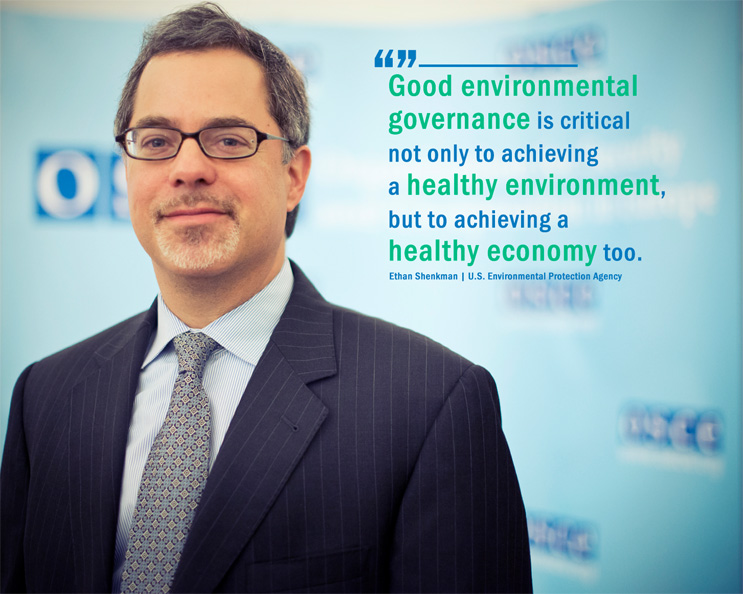Environmental Governance: A Key Stepping Stone On The Path To Peace And Stability
By Ethan Shenkman, Deputy General Counsel, EPA
Public participation. Information disclosure. Implementable and enforceable laws. Strong accountability mechanisms. In the United States, we sometimes take principles like these for granted. For those who practice environmental law here, we feel intuitively that they are necessary features of any effective legal system. But in many countries around the world — grappling with fundamental issues of democracy and rule of law — these basic principles of “environmental governance” take on an even greater meaning and significance.
The legal community, both in the U.S. and abroad, increasingly recognizes a direct connection between environmental governance and the promotion of rule of law more generally. And we see, based on firsthand experience, how sound environmental governance is essential to ensuring public health — and a healthy economy.
Earlier this year, I had the opportunity to join diplomats from the State Department in Vienna, Austria for the Economic and Environmental Forum of the Organization for Security and Cooperation in Europe (OSCE). The OSCE includes more than 50 countries from North America to Europe to Central Asia. It has a comprehensive focus on security and its activities range from conflict resolution to energy security. The OSCE hosts several Economic and Environmental and Forum events each year because it recognizes the importance of effective environmental institutions, laws, and enforcement in promoting economic growth and ensuring peace and stability in the region. As the U.S. Ambassador to the OSCE, Daniel Baer, emphasized in his plenary statement, environmental governance is an area that “touches all of our lives.”

While discussing environmental governance with officials from throughout the OSCE region, including the newly independent states in Eastern Europe and Central Asia, I was impressed by the uniformly positive response and desire to engage on these issues. The forum recognized promoting strong environmental governance and sustainable development as central elements of OSCE’s comprehensive approach to security and stability. Other countries highlighted a number innovative pilot projects, ranging from the use of microfinance to green the economy, to harnessing the ideas generated by civic participation in promoting resource efficiency.
We look forward to following up on numerous opportunities to transform principles of environmental governance into progress on the ground. Exciting possibilities ahead range from an important international initiative to help countries establish and implement laws to reduce the use of lead paint, particularly in homes where vulnerable children are exposed; to compiling legal framework models to reduce air pollution; to providing implementation assistance for countries seeking to modernize and improve their environmental laws.
EPA has useful wisdom to share on advancing environmental governance given our decades of experience in developing and implementing environmental regulations while the U.S. economy has expanded steadily over time. Supporting international cooperation to address environmental problems is essential to EPA’s mission of protecting human health and the environment. Pollution and other failures to protect valuable natural resources have concrete and direct impacts on people’s lives, and those problems do not respect borders. Because effective governance systems are fundamental to the success of environmental protections, helping build strong environmental institutions and legal structures is a top priority.
